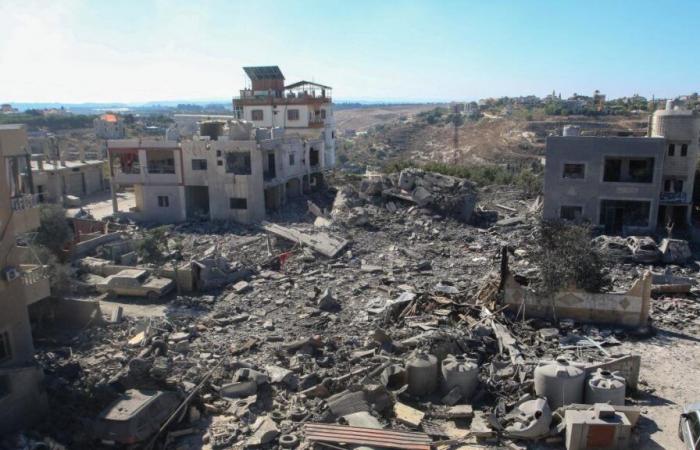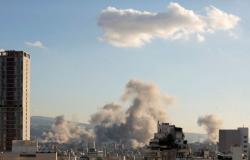INTERNATIONAL – Long-awaited green light. Israel approved this Tuesday evening, November 26, a ceasefire in its war in Lebanon with Hezbollah, after more than a year of cross-border hostilities and two months of open war between the Israeli army and the powerful Lebanese formation. armed and supported by Tehran. Here's what we know about this agreement.
Lebanon: Benjamin Netanyahu announces the adoption of a ceasefire, but warns Hezbollah
• What are the terms of this ceasefire?
The agreement was negotiated under the aegis of the United States and France. It must come into force on Wednesday at 4 a.m. local (3 a.m. in Paris), US President Joe Biden said from the White House.
According to the American news site Axios, the American project negotiated in recent days provides for a 60-day truce during which Hezbollah and the Israeli army would withdraw from southern Lebanon to allow the Lebanese army to deploy there. The plan includes the establishment of an international committee to monitor its implementation, Axios added, specifying that the United States would have given assurances of its support for Israeli military action in the event of hostile acts by Hezbollah.
International diplomacy has relied on UN Security Council Resolution 1701 which ended the previous war between Israel and Hezbollah in 2006, and stipulates that only the Lebanese army and peacekeepers can be deployed on the southern border of Lebanon. On the duration of this ceasefire, Israeli Prime Minister Benjamin Netanyahu however indicated that it would depend “ of what will happen in Lebanon ».
In any case, the bombings are set to continue until the exact time of entry into force. Shortly after Benjamin Netanyahu's statement, another strike targeted a building in the Hamra shopping district, in the heart of Beirut, an AFP journalist noted. The Israeli army reported new projectile fire targeting the national territory from Lebanon.
• For Lebanon, a “ fundamental step » towards regional stability
Lebanese Prime Minister Najib Mikati said the ceasefire agreement between Israel and Hezbollah constituted a “ fundamental step » towards regional stability. Thanking Paris and Washington for their involvement in the truce agreement, Najib Mikati indicated that his government was committed to “ strengthen the presence of the army in the south of the country »a stronghold of the Lebanese Islamist movement.
Hezbollah has not yet reacted.
• Israel still threatens Hezbollah
For his part, Benjamin Netanyahu indicated that “in full agreement with the United States, we maintain complete freedom of military action” in Lebanon. “If Hezbollah violates the agreement and tries to rearm, we will attack,” he added.
A truce in Lebanon will allow Israel to “ focus on the Iranian threat »and« intensifier » its pressure on Palestinian Hamas, against which it is leading a deadly offensive in the Gaza Strip in retaliation for its unprecedented attack on Israeli soil on October 7, 2023, he also highlighted.
Figure of the far right ally of Benjamin Netanyahu, Itamar Ben Gvir, Minister of National Security, and member of the security cabinet estimated that the ceasefire agreement in Lebanon was “ a historical error ». “This agreement does not meet the objective of the war: to bring the inhabitants of the north home safely”he reacted on Telegram.
• The relief of the international community
Joe Biden and Emmanuel Macron, on the front line to negotiate this agreement, assured in a joint press release that this agreement “ will protect Israel from the threat posed by Hezbollah and other terrorist organizations operating from Lebanon.”
“The United States and France are committed to playing a leading role in supporting international efforts to strengthen the capabilities of the Lebanese Armed Forces and foster economic development throughout Lebanon in order to promote stability and prosperity in the region »they added.
The American president also promised in a short speech at the White House a new initiative to obtain a ceasefire in Gaza. “In the coming days, the United States will again lead an effort with Turkey, Egypt, Qatar, Israel and other countries to achieve a ceasefire in Gaza, the release of hostages and the end of the war without Hamas in power »said Joe Biden.
The President of the European Commission, Ursula von der Leyen, for her part congratulated this “very encouraging news, above all for the Lebanese and Israeli people affected by the fighting.” German Foreign Minister Annalena Baerbock sees this “a ray of hope for the entire region”.
Also see on HuffPost :
War in Lebanon: new Israeli strikes on Beirut cause “massive destruction”
Israel-Hamas war: the controversial Bezalel Smotrich wants to “conquer” Gaza and empty it of its inhabitants






